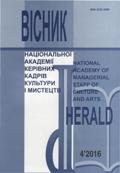"GERMAN WORLD" OR THE ORIGINAL CULTURE:
SWISS-GERMAN CULTURAL RELATIONS IN 1930-1940
"GERMAN WORLD" OR THE ORIGINAL CULTURE:
SWISS-GERMAN CULTURAL RELATIONS IN 1930-1940
Author(s): Dmytro Vedenieiev, Victoriya PechyborshchSubject(s): Anthropology, Ethics / Practical Philosophy, Political Philosophy, Social Philosophy, Communication studies, Sociology, Recent History (1900 till today)
Published by: Національна академія керівних кадрів культури і мистецтв
Keywords: Swiss Confederation; Germany; cultural associations;мthe German-Swiss language community; the fund «Pro Helvetia»; the German-Swiss Werkbund
Summary/Abstract: The objectives are to analyze the development of the relations in the sphere of the culture between Switzerland and Germany in the 1930-40’s and to determine the reasons for termination of the cultural dialogue between the countries after the arrival of national socialists in German and conditions of its recovery after the Second World War. The historical-genetic and comparative methods were chosen for the study. With the use of the historical-genetic method, the evolution of the German-Swiss cultural relations in the first half of the XX c. was explored. Appeal to the comparative method has enabled to draw the conclusions about the features of the bilateral cultural relations between Switzerland and Germany in the period between the two world wars, during the war of 1939 – 1945 and post-war years. Scientific novelty of the proposed article is that for the first time in Ukrainian historiography an attempt to explore the development of the cultural relations between Switzerland and Germany in 1930 – 40's was made. Conclusions. The main reasons of the Swiss efforts to withdraw from the involvement in the German cultural world in the late 1930's – 40's were memories of the First World War, when the conflict between the French and German communities had put in jeopardy the peace within the Swiss society, and a desire not to create the pretext for the global public accusations against Switzerland of its involvement in the crimes of the national socialists, which could raise doubts about the issue of Swiss neutrality. The background for the restoration of the cultural dialogue between the countries was the desire of Swiss to support the formation of a new democratic regime in the neighboring country, which was realized through the activities of both individual private artistic associations and institutions, and the work of the Swiss diplomacy, which through the analysis of the cultural situation of the particular German states was searching for the potential areas and ways of cooperation.
Journal: Вісник Національної академії керівних кадрів культури і мистецтв
- Issue Year: 2016
- Issue No: 4
- Page Range: 16-19
- Page Count: 4
- Language: English

